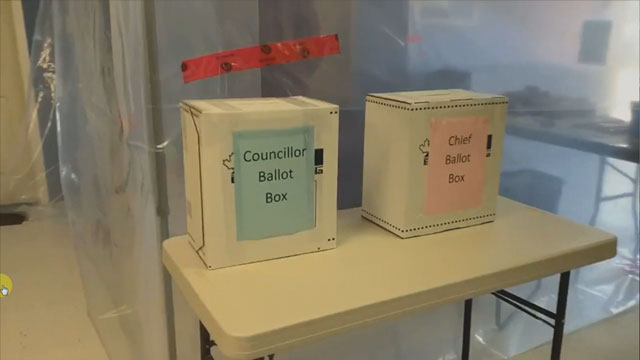
In an abrupt policy shift, First Nation band councils will now be able to adopt a band council resolution allowing current chief and councils to extend their terms for six months with the option to extend for another six months, which means communities won’t have to hold or postpone elections in the midst of the novel coronavirus pandemic.
APTN News has learned that Minister of Indigenous Services Marc Miller, drawing on section 73(f) of the Indian Act, proposed the new measure to cabinet, who agreed to the regulation.
Section 73(f) of the Indian Act gives government power to make regulations “to prevent, mitigate and control the spread of diseases on reserves, whether or not the diseases are infectious or communicable.”
Indigenous Services Canada (ISC) previously stated multiple times that they didn’t have that authority.
“In the current legislative context, neither the Indian Act nor the First Nations Elections Act give the Minister of Indigenous Services the authority to extend the terms of office for currently elected and expiring chiefs and councilors,” reads a chief and council correspondence obtained by APTN.
The change in stance comes after some communities have already held elections in pandemic conditions, while others are gearing up to vote.
Pabineau First Nation in northeastern New Brunswick received a letter from ISC on April 7, notifying them of the policy shift.
“Given the unprecedented situation as leaders in your community you may designate the current council as the appropriate persons. It is suggested that the BCR covers a period of six months following the expiry of your mandate,” the letter stated.
But Pabineau’s elections are slated for April 9, so this option may have come too late.
Shoal Lake 39 first raised concerns over community safety a week prior to their March 26 elections, but were told the vote had to go ahead or they would face a “governance gap.”
Read more: Voting in a time of pandemic: Why Shoal Lake 39 felt pressed to hold an election
When APTN asked Miller about this, the minister again emphasized the government had no authority to postpone elections.
“There is no authority, formally speaking as a factual matter, for me to postpone an election,” he said on March 26.
“What happens factually under the act is that that authority then goes and vests in the band manager which is not necessarily the ideal outcome, so there isn’t a gap per se,” he explained.
“There’s just an inconvenience – a very, very perhaps an undesirable governance result which vests band-like powers within the band manager.”
A day later, the minister “recommend that First Nations do not go forward with upcoming elections,” tweeting that the government would work with communities that choose to postpone.
Canada recognizes the health risks of holding elections during the COVID-19 pandemic. We therefore recommend that First Nations do not go forward with upcoming elections & will work w. communities that choose to postpone their election to ensure leadership continuity. #cdnpoli
— Marc Miller (@MarcMillerVM) March 27, 2020
The message persuaded Pabineau’s leadership to vote two against one in favour of holding elections.
As they saw it, their only option was to go into third party management – or hand control over to the band manger.
“Right now, we are in a crisis and to go without governance in a community would be catastrophic if this pandemic were to get worse or to go for a long period of time,” said Councillor Terry Richardson.
But leadership is concerned about the possibility of spreading COVID-19 by holding elections.
“I just don’t believe that it can be done safely enough if there’s even a small minute risk to any members of our community, and we have a number of Elders in this community that will not have the capacity to come in and vote simply because there’s just far too many risks for them to be circulating in public,” said Chief David Peter-Paul.
Nevertheless, and new measures notwithstanding, they say the vote will go ahead.
Others have already held elections as well, and Miller said “as a rough figure” there are “about 20” on the docket over the coming months.
“But there are a number of them throughout the year and if this epidemic flows on there can be many more.”
Algonquins of Pikwakanagan held their elections on March 28.
Chief Wendy Jocko, who was elected that day, told APTN that Pikwakanagan has a custom election code and felt comfortable they could conduct the vote safely.
“We had three options on how to vote. You could mail in your ballot. You could cast an online vote.”
The third option was to vote in person. On election day, procedures were in place to ensure a sterile environment, Jocko said.
“You were to bring your own pen or your pencil and only one person was allowed in the building at one time.”
There were also elections held in Saskatchewan and British Columbia.










Why is the fed’s making decisions regarding First Nations matters. As we have seen not long ago where the minister feels about First Nations. The govt’s should not be sticking their nose in to First Nations matters.
Its a shame they don’t take serious, the discrimination that still remain in this racist legislation. Fix the discrimination as fast as you make exceptions.